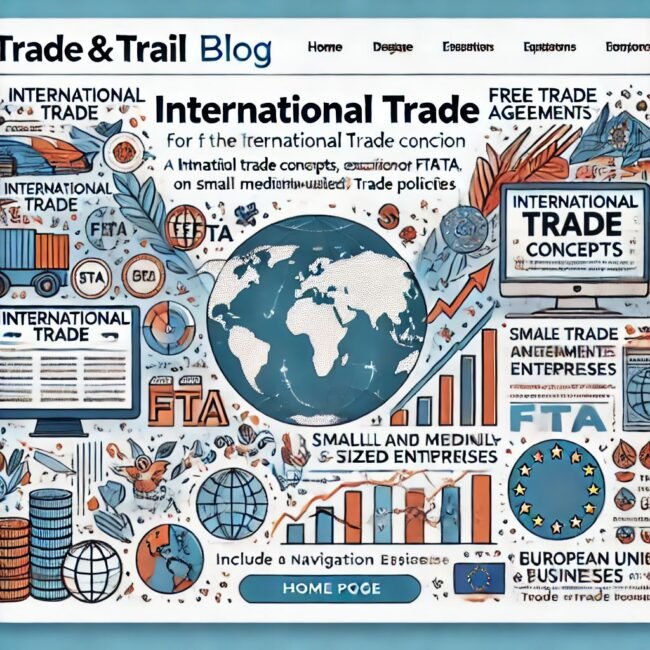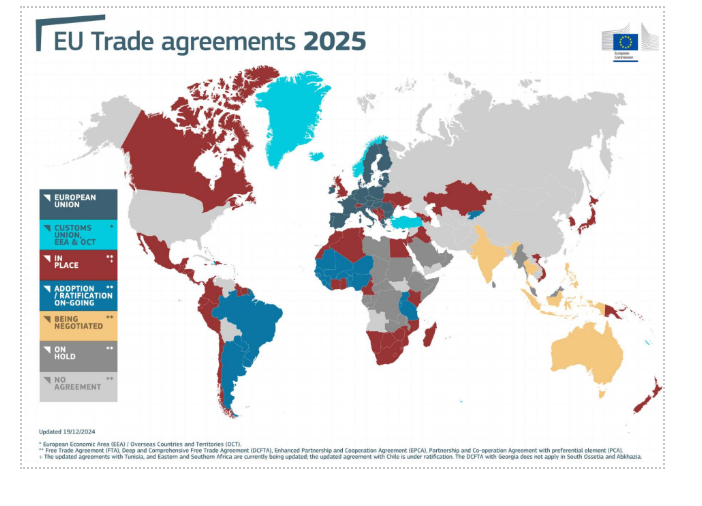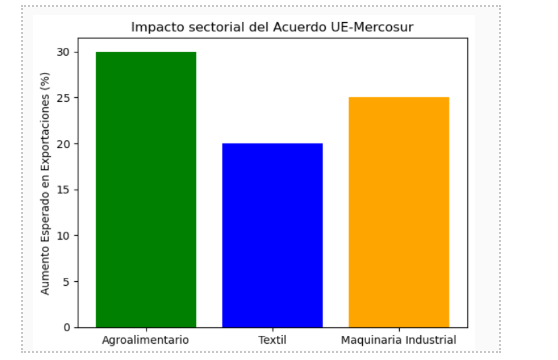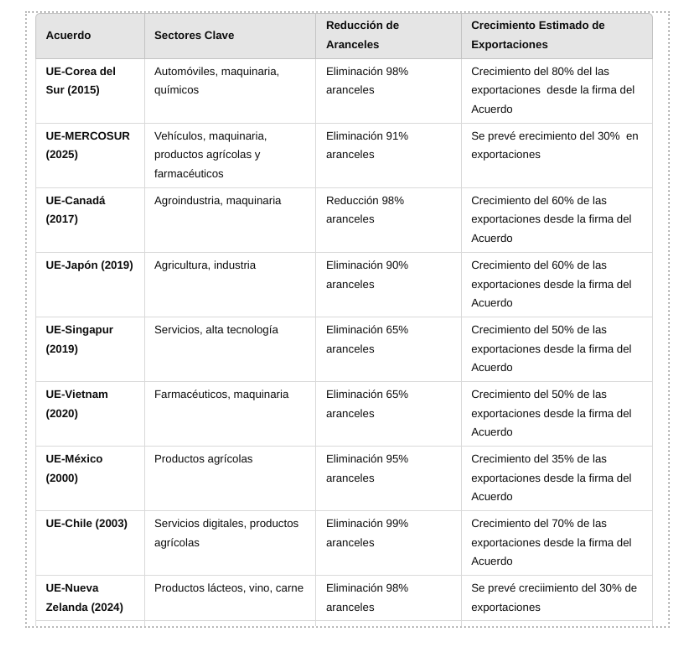
Following on from our last post in "Commercial Geostrategy" section, focused on the EU-MERCOSUR Agreement, we develop this new article centered on the benefits that the EU Free Trade Agreements (FTAs) offer to exporting SMEs.
Given the current moment we are living in (February 2025 and with only one month of the new Trump Administration in the USA), perhaps our readers were interested in having a publication about the new commercial geopolitics that seems to exist with the use of tariffs and trade wars as a weapon of international geopolitics.
But from TRADE&TRAIL, our experience tells us that it is better to let time pass, see how things evolve, and analyze the situation after some time with greater perspective. To read all kinds of questions and speculations, we already have a large number of opinions published almost every hour by both experts and non-experts in this field
On the contrary, we have decided to continue with our weekly publication plan on commercial geopolitics, in which we will address an issue that, although many may think it is not very related to current events, it is; such as Free Trade Agreements. Given the current situation that we face in the future with increasing trade tensions, being part of the EU right now is a golden opportunity for European SMEs that can take advantage of these Agreements that offer stability, business opportunities, and above all, legal security in commercial operations. Therefore, today more than ever, we believe in the need to publish an article like this.
The Role of Trade Agreements in International Trade
In an increasingly interconnected world, international trade has become a key piece for the economic growth of companies, especially for SMEs.
According to data from the International Trade Centre (ITC), SMEs represent around 90% of companies and more than 50% of employment worldwide. However, only 25% of global exports come from these companies. This gap is partly due to the lack of access to information and resources to navigate the complex world of international trade.
This is where free trade agreements play a crucial role, providing a legal and economic framework that facilitates the expansion of SMEs in foreign markets. These treaties eliminate or reduce tariffs, simplify customs procedures, and establish clear rules for the export and import of goods and services. For SMEs, which often lack the resources of large corporations, these agreements represent an opportunity to compete on equal terms. The European Union, as one of the most active players in negotiating trade agreements, has signed numerous treaties that directly benefit small and medium-sized enterprises.
Opportunities for SMEs in EU Agreements
In this article, we will explore how the new trade agreements driven by the European Union (EU) are transforming the landscape for exporting SMEs, offering them competitive advantages and access to broader markets.
The European Union has signed more than 40 trade agreements with countries and regions around the world, creating a network of preferential access for European companies. These treaties not only eliminate tariff barriers but also include specific provisions to support SMEs. For example, the EU-Canada Comprehensive Economic and Trade Agreement (CETA), in force since 2017, has eliminated tariffs for 98% of products and simplified customs procedures, allowing European SMEs to increase their exports to Canada by 15% in just the first three years of implementation.
Additionally, the EU has developed tools such as the Market Access Portal, which provides detailed information on access requirements to more than 120 international markets. This resource is especially useful for SMEs, which often lack the resources to conduct complex market research. According to a report by the European Commission, 70% of SMEs using this portal have managed to identify new export opportunities. It is also worth mentioning that at the national level, we have the Foreign Market Barriers Portal published by the Spanish Secretary of State for Trade.

Analysis of the Main Free Trade Agreements Signed by the EU
The European Union (EU) has established a series of free trade agreements with various countries and regions, aiming to promote trade and economic cooperation. These agreements have allowed the elimination or significant reduction of tariffs, facilitating access to international markets and promoting the growth of European exports. Below are the main data of some of these agreements, highlighting key sectors, tariff reductions, and estimated export growth.
EU-MERCOSUR (2025)
As we analyzed in detail in our previous article, "EU-Mercosur Agreement: Geostrategy and Opportunities," this treaty represents a strategic opportunity for SMEs on both continents. Although still in the process of ratification, the agreement promises to eliminate tariffs for 91% of products traded between both regions.
According to data from the European Commission, EU exports to Mercosur are expected to increase by 30%, benefiting sectors such as agri-food, textiles, and machinery. For European SMEs, this means access to a market of more than 260 million people, with reduced tariffs for products such as wines, cheeses, and industrial machinery.

EU-Mexico (2000 and renewed in 2025)
The Global Agreement between the EU and Mexico, in force since 2000, has eliminated 95% of tariffs, mainly benefiting agricultural products. Since the signing of the agreement, European exports to Mexico have grown by 35%, strengthening trade relations and facilitating access to one of the largest markets in Latin America.
EU-New Zealand (2024)
The free trade agreement between the EU and New Zealand, which came into force in 2024, will eliminate 98% of tariffs, benefiting sectors such as dairy products, wine, and meat. European exports to New Zealand are expected to increase by 30%, representing a significant opportunity for European companies in this market.
EU-Chile (2003 and renewed in 2023)
The Association Agreement between the EU and Chile, in force since 2003, has eliminated 99% of tariffs, benefiting sectors such as digital services and agricultural products. Since the signing of the agreement, European exports to Chile have grown by 70%, promoting greater economic cooperation and facilitating access to one of the most stable markets in Latin America.
EU-Vietnam (2020)
The Free Trade Agreement between the EU and Vietnam, which came into force in 2020, has eliminated 65% of tariffs, benefiting sectors such as pharmaceuticals and machinery. Since the signing of the agreement, European exports to Vietnam have grown by 50%, allowing European companies to access one of the fastest-growing markets in Southeast Asia.
EU-Japan (2019)
The Economic Partnership Agreement between the EU and Japan, which came into force in 2019, has eliminated 90% of tariffs, benefiting sectors such as agriculture and industry. Since the signing of the agreement, European exports to Japan have grown by 60%, strengthening trade relations and facilitating access to one of the largest markets in the world.
EU-Singapore (2019)
The free trade agreement between the EU and Singapore, in force since 2019, has eliminated 65% of tariffs, mainly benefiting the services and high-tech sectors. Since the signing of the agreement, European exports to Singapore have grown by 50%, promoting greater economic cooperation and facilitating access to one of Asia's main financial and technological centers.
UE-Canada (2017)
The Comprehensive Economic and Trade Agreement (CETA) between the EU and Canada, in force since 2017, has allowed the reduction of 98% of tariffs. This agreement has particularly benefited the agri-food and machinery sectors. Since its signing, European exports to Canada have grown by 60%, demonstrating the positive impact of trade liberalization on economic relations between the EU and Canada.
EU-South Korea (2015)
The free trade agreement between the EU and South Korea has been one of the most successful. Since its entry into force in 2015, it has allowed the elimination of 98% of tariffs, mainly benefiting the automotive, machinery, and chemical sectors. Thanks to this agreement, European exports to South Korea have grown by 80%, significantly strengthening trade relations between both regions.

Benefits and Challenges for European SMEs
These agreements not only reduce tariff barriers but also address non-tariff obstacles, such as regulatory differences, creating a more favourable environment for SMEs. By taking advantage of the opportunities provided by Free Trade Agreements, SMEs can expand their operations, access new markets, and contribute to economic growth both nationally and across Europe.
We can highlight the following key benefits that Free Trade Agreements provide to European SMEs:
- Access to new markets: They open doors to international markets, expanding the potential customer base for SMEs.
- Cost reduction: The reduction or elimination of tariffs lowers export costs, making products more competitive abroad.
- Simplification of procedures: Agreements often include measures to streamline customs procedures, reducing the time and costs associated with exporting.
- Intellectual property protection: Agreements incorporate provisions that safeguard companies' innovations and brands, providing legal security in foreign markets
- Promotion of competitiveness and innovation: Exposure to new markets and international competition encourages SMEs to innovate and improve their processes. La exposición a nuevos mercados y la competencia internacional incentivan a las PYMES a innovar y mejorar sus procesos.
However, despite the opportunities offered by free trade agreements, SMEs still face significant challenges.
One of the main obstacles is the lack of knowledge about how to take advantage of these treaties. According to a study by the Inter-American Development Bank (IDB), only 30% of SMEs are familiar with the benefits of trade agreements. To overcome this gap, it is essential that companies receive training and specialized advice.
Another challenge is access to financing. SMEs often have difficulty obtaining credit to cover the initial costs of exporting, such as product certification or adaptation to technical standards. Here, governments and financial institutions can play a key role by offering support programs and specific lines of credit for internationalization.
Therefore, for SMEs to benefit from these treaties, it is essential that they have adequate information and specialized advice. There are various institutions and platforms that can help in this process:
- EU Free Trade Agreements Portal. Spanish Secretary of State for Trade. Link. Provides updated information on the Free Trade Agreements signed by the EU and those currently being negotiated.
- EU Market Access Portal. Link). Provides detailed information on export and import requirements.
Offers information on trade barriers (tariff and non-tariff) existing in all markets worldwide.
- Chambers of Commerce: Offer advice on international logistics and financing for SMEs.
- Banks and Financial Institutions: Offer special lines of credit for exporters.
Conclusions
The free trade agreements promoted by the European Union are transforming the landscape of international trade for European exporting SMEs. These treaties not only eliminate tariff barriers but also offer tools and resources to facilitate the expansion of small and medium-sized enterprises in foreign markets.
However, to make the most of these benefits, it is essential that SMEs receive the necessary support, from training to financing. In a world where international trade remains a key driver for economic growth, free trade agreements are a powerful tool to level the playing field. For SMEs, this not only means access to new markets but also the possibility to grow, innovate, and compete on the global stage.
At TRADE & TRAIL, we are committed to accompanying you on this journey, providing you with the information and resources you need to make the most of these opportunities. If you are interested in delving into the topic of the EU-Mercosur Agreement, do not hesitate to review our analysis published last month: "EU-Mercosur Agreement: Geostrategy and Opportunities."
And remember… THERE IS LIFE BEYOND TURKEY!!
